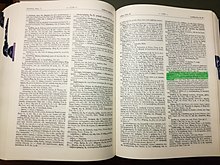Lopadotemachoselachogaleokranioleipsanodrimhypotrimmatosilphioparaomelitokatakechymenokichlepikossyphophattoperisteralektryonoptekephalliokigklopeleiolagoiosiraiobaphetraganopterygon
Lopadotemachoselachogaleokranioleipsanodrimhypotrimmatosilphiokarabomelitokatakechymenokichlepikossyphophattoperisteralektryonoptekephalliokigklopeleiolagoiosiraiobaphetraganopterygon is a fictional dish mentioned in Aristophanes' comedy Assemblywomen.[1]

It is a transliteration of the Ancient Greek word λοπαδοτεμαχοσελαχογαλεοκρανιολειψανοδριμυποτριμματοσιλφιοκαραβομελιτοκατακεχυμενοκιχλεπικοσσυφοφαττοπεριστεραλεκτρυονοπτοκεφαλλιοκιγκλοπελειολαγῳοσιραιοβαφητραγανοπτερύγων. Liddell & Scott (LSJ) translate this as "name of a dish compounded of all kinds of dainties, fish, flesh, fowl, and sauces."[2]
| Look up λοπαδοτεμαχο... in Wiktionary, the free dictionary. |
It is the longest Greek word. The Greek word has 182 letters and 78 syllables. The transliteration has 182 Latin characters. It is the longest word ever to appear in literature according to the Guinness World Records (1990).[3]
Variant forms
The form of the word quoted here is in fact the one listed in LSJ (1940) and quoted therein as having been amended by August Meineke;[2] in contrast to this, F.W. Hall and W.M. Geldart's 1907 edition of Aristophanis Comoediae (used in the Assemblywomen story) reads (differences in bold):
λοπαδοτεμαχοσελαχογαλεοκρανιολειψανοδριμυποτριμματοσιλφιοτυρομελιτοκατακεχυμενοκιχλεπικοσσυφοφαττοπεριστεραλεκτρυονοπτεκεφαλλιοκιγκλοπελειολαγῳοσιραιοβαφητραγανοπτερυγών.[4]
Description
The dish was a fricassée, with at least 16 sweet and sour ingredients, including the following:[3]
- fish slices
- fish of the elasmobranchii subclass (a shark or ray)
- rotted dogfish or small shark's head
- generally sharp-tasting dish of several ingredients grated and pounded together
- silphion "laserwort", apparently a kind of giant fennel
- a kind of crab, shrimp, or crayfish
- honey poured down
- wrasse (or thrush)
- a kind of sea fish or blackbird as topping
- wood pigeon
- domestic pigeon
- rooster
- roasted head of dabchick
- hare, which could be a kind of bird or a kind of sea hare
- new wine boiled down
- wing and/or fin
Context
The term is used in the ultimate chorus of the play when Blepyrus (and the audience) are summoned to the first feast laid on by the new system.
[1167] And you others, let your light steps too keep time.
[1168] Very soon we'll be eating
[1170] lepadotemachoselachogaleokranioleipsanodrimypotrimmatosilphiokarabomelitokatakechymenokichlepikossyphophattoperisteralektryonoptekephaliokigklopeleiolagoiosiraiobaphetraganopterygon. [sic]
[1175] Come, quickly, seize hold of a plate, snatch up a cup, and let's run to secure a place at table. The rest will have their jaws at work by this time.— translation ed. Eugene O'Neill, 1938[1]
English translations
In English prose translation by Leo Strauss (1966), this Greek word is rendered as "oysters-saltfish-skate-sharks'-heads-left-over-vinegar-dressing-laserpitium-leek-with-honey-sauce-thrush-blackbird-pigeon-dove-roast-cock's-brains-wagtail-cushat-hare-stewed-in-new-wine-gristle-of-veal-pullet's-wings".[5]
English verse translation by Benjamin Bickley Rogers (1902) follows the original meter and the original way of composition:
Plattero-filleto-mulleto-turboto-
-Cranio-morselo-pickleo-acido-
-Silphio-honeyo-pouredonthe-topothe-
-Ouzelo-throstleo-cushato-culvero-
-Cutleto-roastingo-marowo-dippero-
-Leveret-syrupu-gibleto-wings.[6]
Older English verse translation by Rev. Rowland Smith (1833) breaks the original word into several verses:
Limpets, oysters, salt fish,
And a skate too a dish,
Lampreys, with the remains
Of sharp sauce and birds' brains,
With honey so luscious,
Plump blackbirds and thrushes,
Cocks' combs and ring doves,
Which each epicure loves,
Also wood-pigeons blue,
With juicy snipes too,
And to close all, O rare!
The wings of jugged hare![7]
See also
References
- "Aristophanes, Ecclesiazusae (ed. Eugene O'Neill, Jr.), line 1163". Perseus.tufts.edu. Retrieved 2011-01-27.
- λοπαδοτεμαχοσελαχογαλεοκρανιολειψανοδριμυποτριμματοσιλφιοκαραβομελιτοκατακεχυμενοκιχλεπικοσσυφοφαττοπεριστεραλεκτρυονοπτοκεφαλλιοκιγκλοπελειολαγῳοσιραιοβαφητραγανοπτερύγων. Liddell, Henry George; Scott, Robert; A Greek–English Lexicon at the Perseus Project.
- Guinness Book of World Records, 1990 ed, pg. 129 ISBN 0-8069-5790-5
- Aristophanes (1907). "1169–1175". Aristophanis Comoediae. 2 (F.W. Hall and W.M. Geldart ed.). Oxford: Clarendon Press.
- "Leo Strauss: On Aristophanes' Ecclesiazusae, & translation [1966]". Archive.org. Retrieved 2013-03-20.
- "The Ecclesiazusae of Aristophanes". Archive.org. Retrieved 2013-03-20.
- Rev. Rowland Smith (1833). The Ecclesiazusae, or Female Parliament. Oxford.